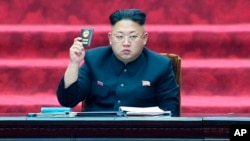U.S. National Security Adviser Susan Rice said the Obama Administration has seen no definitive sign of a transfer of power in North Korea, where state media have been mostly mute on the whereabouts of leader Kim Jong Un. Some analysts say Kim’s absence may be the latest attempt to gain attention as the global community is distracted by other world events.
Appearing Sunday on the NBC program “Meet the Press,” Rice was asked if she believes Kim Jong Un remains the leader of North Korea.
"Obviously, we’re watching very carefully what’s happening in North Korea. It’s a country that we monitor with great attention. We have not seen any indication of a transfer of power, at this point in North Korea that we view as definitive. But, we’ll continue to watch it carefully," said Rice.
Last week, U.S. State Department spokeswoman Jen Psaki had little to say about Kim’s absence other than to say she was aware of the reports, adding there is little reliable information provided by what she called the “opaque” North Korean regime.
Kim, believed to be in his early 30s, has not been seen publicly since September 3 and was absent during an event Friday commemorating the founding of the ruling North Korean Workers’ Party. State media have said the North Korean leader is experiencing "discomfort."
Korea Society Vice President Stephen Noerper said he does not view the absence as very significant.
"Kim Jong Un himself has had two extended periods of absence before this and this is actually something that his father and his grandfather also did, which was to not appear in press or media for a period of time. So, there’s an element of ‘keep them guessing,’" said Noerper.
He is quick to add that something may have happened to Kim, although he says analysts who watch North Korea closely have little insight into whether Kim is the target of a power struggle, is ill or is simply seeking international attention that is distracted to the Middle East and Ukraine.
The South Korean news agency Yonhap quoted former U.S. Embassy Deputy Chief of Mission Mark Tokola as saying North Korean leaders have a history of wanting to receive international attention and Kim’s absence may be a non-provocative way to get it. Tokola believes Kim is still very much in charge.
The Washington Post reported the absence comes at a time of North Korean diplomatic activity involving extensive travel by Foreign Minister Ri Su Yong, who addressed the UN General Assembly last month, the first time a North Korean diplomat has done so in 15 years. The country’s international affairs secretary Kang Sok Ju has also recently returned from Europe and met Mongolia’s president in Beijing.
North Korea has also engaged in talks with Japan over the abduction of Japanese citizens, and two top officials visited Seoul October 4 to attend the closing ceremonies of the Asian Games.
Bruce Bennett of the RAND Corporation suggests the recent diplomatic flurry is a sign of a troubled economy and society in the North.
"I think they’re reaching out in all sorts of places to see what help they can get. Of course, they’re not willing to offer much in return for that help, but I think they’re trying to grab for straws, going out to a variety of places, even going to Seoul. That was such a surprise last weekend. They came, and what were they prepared to negotiate? They were prepared to negotiate to come back and negotiate again. That’s not a whole lot to be offering," said Bennett/
Yet the North appears unwilling to talk to the United States. The Washington Post quoted a senior Obama administration official as saying the North is "trying to gain acceptance as a normal nation on the world stage, and to keep their nuclear weapons program in the process."
Evans Revere, a former U.S. negotiator with Pyongyang and a senior fellow at the Center for Northeast Asian Policy Studies, said the North may be resorting to a familiar pattern: a charm offensive, followed by an agreement, then a break in the dialogue, collapse of the agreement, followed by rising tensions.
Last week, the Koreas traded small arms fire after Pyongyang shot at a propaganda-filled balloon sent by South Korean activists.




